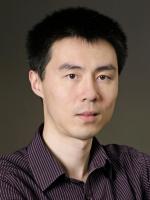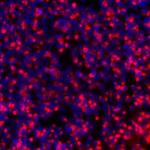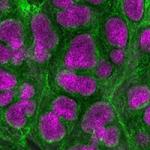
Guang Hu, Ph.D.
Senior Investigator
Epigenetics & RNA Biology Laboratory / Stem Cell Biology Group
NIEHS
Research Topics
Guang Hu, Ph.D., leads the Stem Cell Biology Group within the NIEHS Epigenetics and Stem Cell Biology Laboratory, and holds a secondary appointment in the NIEHS Reproductive and Developmental Biology Laboratory.
The Stem Cell Biology Group aims to understand the regulation of the pluripotent state in cells in culture and during early embryonic development. Pluripotent cells have the ability to develop into all cells of the adult body, and therefore show great promises in both basic and translational research. Further, they provide new tools and opportunities to investigate the impact of environmental exposures, as well as their interactions with genetic factors, on human development and health. To fully realize these potentials, however, it is important to understand the molecular basis of the defining characteristic of the pluripotent cells: pluripotency.
We use a combination of functional genetics, genomics, cell biology, and developmental biology tools to systematically identify and dissect the function of regulators in pluripotent cells. We have uncovered several novel transcriptional and post-transcriptional mechanisms that govern the pluripotent state, and are continuing to investigate the function of these regulators in embryonic stem cells, induced pluripotent stem cells, adult stem cells, and mouse development.
In addition, we are investigating genes that influence the transition between different types of pluripotent stem cells, and between pluripotent stem cells and germ cells. Finally, we are carrying out genetic screens and single cell analysis to identify novel regulators of stem cell fate choices. Our studies will provide new insights to mammalian development, and facilitate the use of pluripotent stem cells in disease investigation, regenerative medicine, and environmental health sciences.
Major Areas of Research
- Embryonic stem cell self-renewal and pluripotency
- Somatic cell reprogramming
- Embryonic development
- Germ cell development
Biography
Dr. Hu earned his Ph.D. in 2003 at Baylor College of Medicine, and was a Helen Hay Whitney Foundation fellow from 2004 to 2007. He completed a postdoctoral fellowship at Harvard Medical School under Stephen Elledge, Ph.D., before joining NIEHS in 2009.
Selected Publications
- Zheng X, Yang P, Lackford B, Bennett BD, Wang L, Li H, Wang Y, Miao Y, Foley JF, Fargo DC, Jin Y, Williams CJ, Jothi R, Hu G. CNOT3-Dependent mRNA Deadenylation Safeguards the Pluripotent State. Stem Cell Reports. 2016;7(5):897-910.
- Wang L, Du Y, Ward JM, Shimbo T, Lackford B, Zheng X, Miao YL, Zhou B, Han L, Fargo DC, Jothi R, Williams CJ, Wade PA, Hu G. INO80 facilitates pluripotency gene activation in embryonic stem cell self-renewal, reprogramming, and blastocyst development. Cell Stem Cell. 2014;14(5):575-91.
- Wang L, Miao YL, Zheng X, Lackford B, Zhou B, Han L, Yao C, Ward JM, Burkholder A, Lipchina I, Fargo DC, Hochedlinger K, Shi Y, Williams CJ, Hu G. The THO complex regulates pluripotency gene mRNA export and controls embryonic stem cell self-renewal and somatic cell reprogramming. Cell Stem Cell. 2013;13(6):676-90.
- Hu G, Kim J, Xu Q, Leng Y, Orkin SH, Elledge SJ. A genome-wide RNAi screen identifies a new transcriptional module required for self-renewal. Genes Dev. 2009;23(7):837-48.
Related Scientific Focus Areas





Molecular Biology and Biochemistry
View additional Principal Investigators in Molecular Biology and Biochemistry
This page was last updated on Tuesday, July 17, 2018